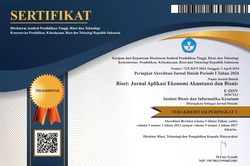THE EFFECT OF FINANCIAL DISTRESS AND TAX LOAD ON TAX INCENTIVE PARTICIPATION PROGRAMS AFFECTED BY THE COVID-19 PANDEMIC
DOI:
https://doi.org/10.37641/riset.v4i2.172Keywords:
Financial Distress, Tax Burden, National Economic Recovery Program, Covid-19, Tax IncentiveAbstract
During the Covid-19 pandemic, The Government of Indonesia implemented tax incentive programs for taxpayers affected by Covid-19. This study examines several factors that affect companies' participation in tax incentives, while The population data used consists of 139 companies listed on the Indonesia Stock Exchange. The data is secondary data from quarterly and financial reports of the listed firm on the Indonesia Stock Exchange. This study employs logistic regression analysis to examine the motivation to participate in the program. Our findings relieve that financial distress motivates the companies to engage in the tax incentive program. On the other hand, the tax burden positively affects the company's participation in the tax incentive program.
Downloads
References
Ahmar, N., Pujiati, D., & Usman, M. N. (2018). Tax Incentive-Based Economic Policy Model. Simposium Nasional Keuangan Negara, 41–57. https://jurnal.bppk.kemenkeu.go.id/snkn/article/download/212/111/
Assidi, S., Aliani, K., & Omri, M. A. (2016). Tax Optimization and The Firm’s Value: Evidence from The Tunisian Context. Borsa Istanbul Review, 16(3), 177–184. https://doi.org/10.1016/j.bir.2016.04.002
Bank Indonesia. (2020). Economic Performance during the Covid-19 Pandemic. https://www.bi.go.id/id/publikasi/laporan/Documents/4_LPI2020_BAB2.pdf
Darussalam. (2020). The Role of Taxes as a Rescuer for The Impact of Covid-19. DDTC News. https://news.ddtc.co.id/peran-pajak-as-selamat-dampak-Covid-19-24258
Edwards, A., Schwab, C., & Shevlin, T. (2016). Financial Constraints and Cash Tax Savings. The Accounting Review, 91(3), 859–881. https://doi.org/10.2308/accr-51282
Fernandes, A. A. T., Figueiredo Filho, D. B., Rocha, E. C. da, & Nascimento, W. da S. (2020). Read This Paper If You Want to Learn Logistic Regression. Revista de Sociologia e Política, 28(74). https://doi.org/10.1590/1678-987320287406en
Fidiana. (2021). Tax Facilities Through Omnibus Law Taxation: A Canon Taxation Review. Policy & Governance Review, 5(3), 195–205. https://doi.org/https://doi.org/10.30589/pgr. v5i3.373
Fredriksson, A., & Oliveira, G. M. de. (2019). Impact Evaluation Using Difference in Differences. RAUSP Management Journal, 54(4), 519–532. https://doi.org/10.1108/RAUSP-05-2019-0112
Gopinath, G. (2020). The Great Lockdown: Worst Economic Downturn Since the Great Depression. IMFBlog. https://blogs.imf.org/2020/04/14/the-great-lockdown-worst-economic-downturn-since-the-great-depression/
Gujarati, D. N. (2022). Basic Econometrics. New York: McGraw-Hill.
Hosmer, D. W., Lemeshow, S., & Sturdivant, R. X. (2013). Applied Logistic Regression (3rd ed.). New York: John Wiley & Sons, Inc. https://doi.org/10.1002/9781118548387
Indonesiabaik.id. (2021). Implementation of Social Distancing in Several Regions of Indonesia. Indonesiabaik.Id. https://indonesiabaik.id/infografis/penerapan-psbb-di-sejumlah-wilayah-indonesia
James, S. (2013). Tax and Non-Tax Incentives and Investments: Evidence and Policy Implications. Investment Climate Advisory Services of The World Bank Group, September. https://doi.org/10.2139/ssrn.2401905
Kartiko, N. D. (2020). Tax Incentives in Responding to The Impact of The Covid-19 Pandemic on The Tourism Sector. Jurnal Pajak Dan Keuangan Negara (PKN), 2(1), 124–137. https://doi.org/10.31092/jpkn.v2i1.1008
Kuncoro, A., Purwanti, D., & Andriani, A. F. (2020). The Influence of Tax Audit , Tax Avoidance and Company Risk on Company Involvement in Tax. RISET : Jurnal Aplikasi Ekonomi Akuntansi Dan Bisnis, 2(1), 181–203. https://doi.org/https://doi.org/10.35212/riset.v2i1.47
Kurniati, D. (2021). 2020 MSME Incentives Lack of Interest, This is The Government’s Step This Year. DDTC News. https://news.ddtc.co.id/insentif-umkm-2020-minim-peminat-ini-step-government-tahun-ini-27563
Okafor, L. E., Bhattacharya, M., & Apergis, N. (2019). Bank Credit, Public Financial Incentives, Tax Financial Incentives and Export Performance During The Global Financial Crisis. The World Economy, 43(1), 114–145. https://doi.org/10.1111/twec.12848
Pratama, A. (2018). Determinants of Indonesian Public Listed Companies to Participate in The Tax Amnesty. Indonesian Journal of Sustainability Accounting and Management, 2(2), 136. https://doi.org/10.28992/ijsam.v2i2.57
Putra, A., & Solikin, A. (2018). Unattractive Incentive: The Case of Tax Allowance Policy in Indonesia’S Shipyard Industry. Jurnal BPPK : Badan Pendidikan Dan Pelatihan Keuangan, 11(2), 101–113. https://doi.org/10.48108/jurnalbppk.v11i2.351
Richardson, G., Taylor, G., & Lanis, R. (2015). The Impact of Financial Distress on Corporate Tax Avoidance Spanning The Global Financial Crisis: Evidence From Australia. Economic Modelling, 44, 44–53. https://doi.org/10.1016/j.econmod.2014.09.015
Rodgers, D., & Hambur, J. (2018). The GFC Investment Tax Break. http://www.rba.gov.au
Sidik, S. (2020). 50 More Issuers Only Strong Until June, This Is A Suffering Sector. CNBC Indonesia. https://www.cnbcindonesia.com/market/20200513100913-17-158086/50-lebih-emiten-cuma-kuat-sampai-juni-ini-sektor-tersengsara
Stamatopoulos, I., Hadjidema, S., & Eleftheriou, K. (2016). Explaining Corporate Effective Tax Rates Before and During The Financial Crisis: Evidence from Greece. Schweizer Archiv Für Neurologie Und Psychiatrie (Zurich, Switzerland : 1985), 138(1), 31–44. https://mpra.ub.uni-muenchen.de/73787/
Wu, L., Wang, Y., Luo, W., & Gillis, P. (2012). State Ownership, Tax Status and Size Effect of Effective Tax Rate in China. Accounting and Business Research, 42(2), 97–114. https://doi.org/10.1080/00014788.2012.628208
Yunianto, T. K. (2020). Production Drops During the Pandemic, Half of Textile Factories Threatened To Close. Katadata.Co.Id. https://katadata.co.id/ekarina/berita/5ed9bc61b6790/produksi-anjlok-saat-pandemi-separuh-pabrik-tekstil-terancam-tutup
Zelekha, Y., & Sharabi, E. (2012). Corruption, Institutions and Trade. Economics of Governance, 13(2), 169–192. https://doi.org/10.1007/s10101-012-0109-7
Zwick, E., Mahon, J., Chamberlain, G., Contos, G., Dew-Becker, I., Foley, F., Goldsmith-Pinkham, P., Greenwood, R., Hanson, S., Hodge, R., Kitchen, J., Langetieg, P., Manoli, D., Sorkin, I., Summers, L., Sunderam, A., Turner, N., Winberry, T., Yagan, D., & Yogo, M. (2017). Tax Policy and Heterogeneous Investment Behavior. The American Economic Review, 107(1), 217–248. https://doi.org/10.1257/aer.20140855







